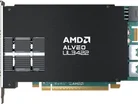AMD Launches Ultra-low Latency Accelerator Card for Trading

High-performance and adaptive computing leader, AMD, announced the launch of the Alveo UL3422 FinTech accelerator, the latest addition to its family of record-breaking Alveo cards(1) designed for ultra-low latency electronic trading applications.
A leader in technology platforms for the financial services industry, the new accelerator from AMD is designed for high-frequency trading (HFT) at extremely low latencies, enabling proprietary traders, market makers, hedge funds, brokerages and exchanges to execute trades at nanosecond speeds.
With its field-programmable gate array (FPGA) platform – a common technology for ultra-low latency trading in HFT – firms can leverage trade-executing technology up to seven times faster than prior generation AMD FPGA technology(2).
AMD: Leadership in high-frequency trading
This past summer, the AMD Alveo UL3524 FinTech accelerator powered by a specialized FPGA tailored for ultra-low latency data transmission achieved a world-record STAC-T0 benchmark result, beating the world-record performance, which was based on the AMD Virtex™ UltraScale+™ VU9P device(1).
The newly introduced Alveo UL3422 card is powered by the same FPGA as its predecessor, the Alveo UL3524 accelerator, but streamlines the port density and card design, and offers the same record-breaking performance in half the size(1).
The slim FHHL form factor allows firms to optimise compute density per server and rack space of their infrastructure, co-located at the market exchange.
“In ultra-low latency trading, a nanosecond can determine the difference between a profitable or losing trade,” says Girish Malipeddi, Director of Product Marketing at AMD.
“The Alveo UL3422 accelerator card delivers the same record-breaking tick-to-trade performance of its predecessor, the Alveo UL3524, but now in a slim form factor to lower barriers to entry for broader deployment among HFT firms.”
What’s more, the flexibility of FPGA technology accommodates diverse algorithms – allowing financial institutions to accelerate custom trading algorithms in hardware, where they can tailor and adapt their trading systems to evolving market conditions and competitive landscape.
To simplify the increasing adoption of AI in HFT and algorithmic trading market, AMD deploys open-source PyTorch development flow technology as well as pre-built IP solutions from its partners, so customers can integrate low-latency, streaming AI accelerators into their trading strategies.
The company’s network of ecosystem partners provides IP, development frameworks and interop-tested HFT servers for ease of development – enabling a fast path to trading profitably.
AMD: Powering financial services and beyond
With a history of supplying Fortune 500 and research institutions with high-performance and adaptive computing technologies, AMD is improving efficiencies in the financial services industry (FSI).
Alongside its FPGA-based accelerators, AMD provides a broad portfolio of CPU, GPU and low-latency networking solutions, providing performance and efficiency across the full spectrum of FSI workloads.
In fact, AMD services reach across markets to supply modern technology for data centers, AI, PC, gaming and embedded systems. Its services focus on technological innovation to address significant global challenges. AMD's corporate culture emphasizes execution, directness, collaboration and inclusivity.
To find out more about the Alveo UL3422 accelerator, visit AMD's website by clicking here.
Make sure you check out the latest edition of FinTech Magazine and also sign up to our global conference series – FinTech LIVE
FinTech Magazine is a BizClik brand
Footnotes
1: The 2024 AMD world record for latency is based on 3rd party testing commissioned by AMD and Exegy, by Strategic Technology Analysis Center, LLC (STAC®) in April 2024, using the STAC-T0 benchmark to test the AMD Alveo UL3524 accelerator card powered by the AMD Virtex Ultrascale+ VU2P FPGA, running on the Exegy nxFramework and Exegy nxTCP-UDP-10g-ULL IP Core, in a Dell PowerEdge R7525 server with AMD EPYC 7313 processors. See https://stacresearch.com/news/AMD240422 for the full STAC report. AMD holds the previous world record for latency (2020): https://www.stacresearch.com/news/XLX200514. Stated results for the Alveo UL3524 accelerator have been extrapolated to the AMD Alveo UL3422 card, based on identical silicon and product features. (ALV-20).
2. Based on a simulated comparison by AMD using the Synopsis VCS 2019.06-SP2 ultra-low late


